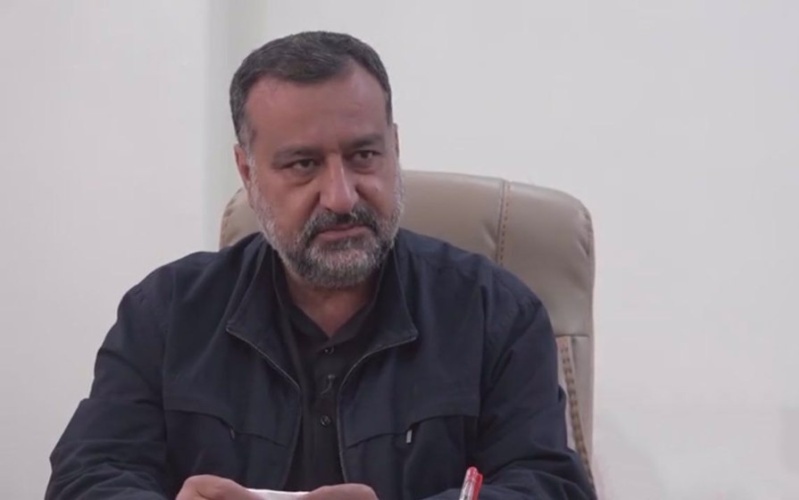Iran Revolutionary Guards Commander Seyed Raza Mousavi, assassinated by Israel in southern Damascus, Syria, December 25, 2023
Beyond Gaza: Israel Expands The “Indirect War” on Hamas, Hezbollah, and Iran
UPDATES: Israel Assassinates Iran Revolutionary Guards Commander in Syria
Israel is stepping up years of airstrikes on Assad regime, Iranian, and Hezbollah targets, shifting tactics to the killing of commanders and troops as well as the destruction of missiles and weapons.
Meanwhile, Jordan is carrying out cross-border strikes on drug smugglers, linked to the regime and Assad, in the hope of curbing a multi-billion dollar trade in the amphetamine Captagon.
Throughout the Assad regime’s 13-year deadly repression of protests in Syria, Israel has struck the regime and its allies, seeking to curb the transfer of military material from Iran — an essential backer of the regime — to Lebanon’s Hezbollah.
Since October 7, with Hamas’ mass killings inside Israel and then Israel’s mass killings across Gaza, the Israelis have targeted people as well as air defense systems, cargo trucks, and infrastructure, according to “six sources with direct knowledge of the matter”.
The sources include an Assad regime military intelligence officer and a “commander in the regional alliance backing Damascus”.
The commander and “two additional sources familiar with Hezbollah’s thinking” said Israel had abandoned unspoken “rules of the game” and is “no longer cautious” about inflicting heavy casualties on Hezbollah’s fighters.
The commander explained:
They used to fire warning shots — they’d hit near the truck, our guys would get out of the truck, and then they’d hit the truck.
Now that’s over. Israel is now unleashing deadlier, more frequent air raids against Iranian arms transfers and air defense systems in Syria. They bomb everyone directly. They bomb to kill.
The Israelis have accompanied the strikes with a series of assassinations. On Christmas Day, Sayyed Razi Mousavi, the commander in Syria of the Iran Revolutionary Guards’ Quds Force, was killed in bombing of the main position of the Iranian military, south of Damascus.
On January 2, an Israeli strike in southern Beirut killed Saleh al-Arouri, Hamas’s deputy political head, and military commanders.
On Monday, Wissam al-Tawil, a commander of the Hezbollah’s elite Radwan force, was killed in the town of Majdal Selm in Lebanon when a missile slammed into the SUV in which he was travelling. Hamas official Hassan Akasha, allegedly responsible for launching rockets at northern Israel, was slain in Beit Jinn in southern Syria.
Jordan’s Strikes v. Iran-Linked Smugglers
In their second raid within a week, Jordanian warstrikes carried out four strikes inside Syria late Wednesday, targeting suspected farms and hideouts of Iran-linked drug smugglers.
A long-time analyst of the Syrian conflict said at least three people were killed, including “a prominent Captagon trafficker tied to” the Assad regime’s intelligence services.
Jordan’s military has stepped up the fight against the Captagon trade following clashes last month with dozens of people suspected of links to militias backed by the Assad regime and Iran. Smugglers were carrying weapons and explosives, as well as large hauls of the amphetamine, across the border.
Three strikes on Tuesday were on suspected locations of drug dealers in the towns of Shaab and Arman in Suwayda Province in southern Syria, near the Jordanian border. The fourth hit a farm near the village of Malah.
Last Thursday, Jordanian forces also struck Suwayda amid fighting with smugglers.
Jordanian forces arrested this morning 15 smugglers (5 others killed) following hours of clashes with Assad's drug cartels which crossed border from #Syria. It's biggest number caught in nearly 2 years.
627,000 Captagon pills & 3,439 Hashish packs seized. https://t.co/CAPTuoXGue pic.twitter.com/uzCZ5dPZjQ— Qalaat Al Mudiq (@QalaatAlMudiq) January 6, 2024
About 80% of the world’s Captagon supply is produced in Syria. The UK Government says the drug is a “financial lifeline” of $57 billion for the Assad regime.
The extent of the Captagon trade has been highlighted in the past three years by interceptions of large shipments. They include a shipment of 2.1 million Captagon pills with a value of $46 million, moving from Syria to Saudi Arabia via Romania in April 2020; 5.25 tons of Captagon seized in Greece in July 2019; 84 million Captagon pills confiscated in Salerno, Italy on July 1, 2020; 11 million pills in Egypt in November 2020; and Malaysia’s discovery of 94.8 million pills in March 2021.
In the spring, the US, European Union, and the UK sanctioned dozens of individuals and entities linked to the trade. They included Khalid Qaddour, a Syrian businessman who is a close associate of Bashar al-Assad’s brother Maher, the commander of the 4th Division of the regime’s Army; Samer Kamal al-Assad, a cousin of the Assads who allegedly oversees Captagon facilities in the regime-controlled port city of Latakia in western Syria; and another Assad cousin, Wassim Badi al-Assad, accused of smuggling contraband, Captagon and other drugs throughout the region with the regime’s tacit support.
See also US, UK, and EU Sanction Assad Regime Over Syria’s Illegal Drugs Trade

